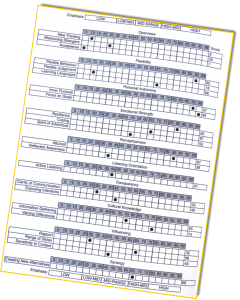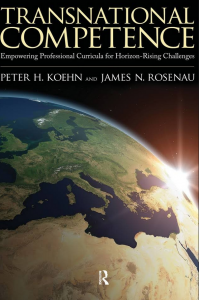Competence checklists for Intercultural Interaction
There is a wide range of checklist and assessment instruments for evaluating staff and student competence for intercultural interaction competence. Here we introduce a few of them.
Transnational competence
Koehn & Rosenau (2010) developed their transnational-competence framework that empower professional curricula and is applicable across some critical higher education professions. The framework offers higher-education leaders around the world useful ideas for enhancing and transforming professional programs so that graduating practitioners will be prepared with the skills needed to manage horizon-rising challenges that connect populations, ecosystems, and fields of study. It is aimed principally at higher-education leaders and graduating professionals throughout the world.
Dimensions of transnational competence
1 Analytic competence
- Understanding central values, practices of the other
- Ability to link it to one’s own circumstances
- Assesment of alternative cultural paths
- Choosing the right strategy, learning from the past
2 Emotional competence
- Motivation and ability to open oneself up continuously
- Ability to assume and maintain interest and respect for difference
- Ability to manage different identities
- Sense of transnational efficacy (self-confidence)
3 Creative capacity
- Ability to foresee synergistics potential
- Collaborative articulation skills
- To envision mutually acceptable alternatives
- To tap into diverse cultural sources for inspiration
4 Communicative facility
- in spoken and written language: fluency and willingness to use it
- in non-verbal communicative behaviour
- in listening
- leading ongoing reflective dialogues
5 Functional project / task adroitness
- positive interpersonal relationships
- in dealing with conflicts, critisism
- willingness to treat others as equals.
Read more about the framework and ways of assessing the transnational competence in Koehn, P. & Rosenau, J. 2010. Transnational Competence: Empowering Curriculums for Horizon-rising Challenges. Routledge.
The International Profiler (TIP)
The purpose of the International Profiler is to help professionals understand where they typically put the emphasis when working internationally. It helps to reais their awareness of potential areas for further development and suggests actions to fill the gaps. The tool enables to form the basis for a structured exploration of an individualäs international competency requirements.
The (TIP™) process is based on 10 competencies and 22 behavioural dimensions. The TIP delivers a differentiated profile of a person with respect to the emphasis and attention paid to 22 dimensions in the competency set.
Read more about the International Profiler process and how to use the commercial tool at: https://worldwork.global/international-profiler/

Example of a page from the International Profiler showing normed scoress across some dimentions.
Source: Spencer-Oatey & Franklin 2009, p. 188
Sources
Koehn, P. & Rosenau, J. 2010. Transnational Competence: Empowering Curriculums for Horizon-rising Challenges. Routledge.
The International Profiler (TIP)
Spencer-Oatey, H. & Franklin, P. 2009. Intercultural Interaction. A Multidisciplinary Approach to Intercultural Communication. Palgrave MacMillan.

